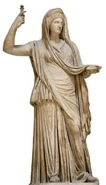| ||||||||||||||||||||||
|
| ||||||||||||||||||||||
Hera was the Greek goddess of women, family, motherhood, marriage, fertility and familial love. She was the daughter of Kronos and Rhea, and the sister and consort of Zeus, and thus the Queen of Olympus. The cow and the peacock were sacred to her.
Hera was known for her jealous and vengeful nature, most notably against Zeus's lovers and offspring, but also against mortals who crossed her, such as Pelias. Paris offended her by choosing Aphrodite as the most beautiful goddess, earning Hera's hatred.
Etymology[]
The name Hera has several etymologies; one possibility is to connect it with hōra (ὥρα), season, and to interpret it as ripe for marriage. John Chadwick, a decipherer of Linear B, remarks "her name may be connected with hērōs, ἥρως, 'hero', but that is no help, since it too is etymologically obscure." A.J. van Windekens, offers "young cow, heifer", which is consonant with Hera's common epithet βοῶπις (boōpis, cow-eyed). E-ra appears in Mycenaean Linear B tablets.
In mythology[]
Hera presides over the right ordering of marriage and is the archetype of the union in the marriage bed, but she is not notable as a mother. The legitimate offspring of her union with Zeus are Ares (the god of war), Hebe (the goddess of youth), Eris (the goddess of discord) and Eileithyia (goddess of childbirth). Enyo, a war goddess responsible with the destruction of cities and attendant of Ares, is also mentioned as a daughter of Zeus and Hera, though Homer equates her with Eris. Hera was jealous of Zeus' giving birth to Athena without recourse to her (actually with Metis), so she gave birth to Hephaestus without him. Hera was then disgusted with Hephaestus' ugliness and threw him from Mount Olympus. In an alternate version, Hera alone produced Hebe after being impregnated by a head of lettuce or by beating her hand on the Earth, a solemnizing action for the Greeks.
Hephaestus gained revenge against Hera for rejecting him by making her a magical throne which, when she sat on, did not allow her to leave. The other gods begged Hephaestus to return to Olympus to let her go, but he repeatedly refused. Dionysus got him drunk and took him back to Olympus on the back of a mule. Hephaestus released Hera after being given Aphrodite as his wife. (A more detailed account acn be found here.)
Hera & Zeus[]
Initially, Hera was resistant of Zeus, but Zeus turned into a cuckoo, flew to her window, pretending to be in distress. Hera took the cuckoo into her arms and cuddled the bird. Zeus turned back into himself and Hera found herself cuddling with Zeus. Hera then agreed to become his wife and the two married.
Hera, the enemy of Heracles[]
Hera was the step-mother of Heracles, and is renowned as his enemy; in her honor; Heracles is the hero who, more than even Perseus, Cadmus or Theseus, introduced the Olympian ways in Greece. When Heracles was about to be born, Hera tried to prevent it by tying the goddess of childbirth, Eileithyia's legs into knots. She was foiled by Galanthis, her servant, who told Hera that she had already delivered the baby. Hera punished Galanthis by turning her into an animal.
While Heracles was still an infant, Hera sent two serpents to kill him as he lay in his cot. Heracles throttled a single snake in each hand and was found by his nurse playing with their limp bodies as if they were a child's toys. The anecdote is built upon a representation of the hero gripping a serpent in each hand, precisely as the familiar Minoan snake-handling goddesses had once done. "The picture of a divine child between two serpents may have been long familiar to the Thebans, who worshiped the Cabeiri, although not represented as a first exploit of a hero".
Later she stirred up the Amazons against him when he was on one of his quests.
One account of the origin of the Milky Way is that Zeus had tricked Hera into nursing the infant Heracles: discovering who he was, she pulled him from her breast, and a spurt of her milk formed the smear across the sky that can be seen to this day. Unlike any Greeks, the Etruscans instead pictured a full-grown bearded Heracles at Hera's breast: this may refer to his adoption by her when he became an Immortal. He had previously wounded her severely in the breast.
Hera assigned Heracles to labor for King Eurystheus at Mycenae. She attempted to make almost each of Heracles' twelve labors more difficult.
When he fought the Lernaean Hydra, she sent a crab to bite at his feet in the hopes of distracting him. When Heracles took the cattle of Geryon, he shot Hera in the right breast with a triple-barbed arrow: the wound was incurable and left her in constant pain, as Dione tells Aphrodite in the Iliad, Book V. Afterwards, Hera sent a gadfly to bite the cattle, irritate them and scatter them. Hera then sent a flood which raised the water level of a river so much that Heracles could not ford the river with the cattle. He piled stones into the river to make the water shallower. When he finally reached the court of Eurystheus, the cattle were sacrificed to Hera.
Eurystheus also wanted to sacrifice the Cretan Bull to Hera. She refused the sacrifice because it reflected glory on Heracles. The bull was released and wandered to Marathon, becoming known as the Marathonian Bull.
Some myths state that in the end, Heracles befriended Hera by saving her from Porphyrion, a giant who tried to rape her during the Gigantomachy, and that she even gave her daughter Hebe as his bride. Whatever myth-making served to account for an archaic representation of Heracles as "Hera's man" it was thought suitable for the builders of the Heraion at Paestum to depict the exploits of Heracles in bas-reliefs.
Echo[]
According to the urbane retelling of myth in Ovid's Metamorphoses, for a long time, a nymph named Echo had the job of distracting Hera from Zeus' affairs by leading her away and flattering her. When Hera discovered the deception, she cursed Echo to only repeat the words of others (hence our modern word "echo").
Leto[]
When Hera discovered that Leto was pregnant and that Zeus was the father, she banned Leto from giving birth on terra-firma, or the mainland, or any island at sea. Poseidon gave pity to Leto and guided her to the floating island of Delos, which was neither mainland nor a real island and Leto was able to give birth to her children on the island. As a gesture of gratitude, Delos was secured with four pillars. The island later became sacred to Apollo. Alternatively, Hera kidnapped Eileithyia, the goddess of childbirth, to prevent Leto from going into labor. The other gods bribed Hera with a beautiful necklace nobody could resist and she finally gave in.
Either way, Artemis was born first and then assisted with the birth of Apollo. Some versions say Artemis helped her mother give birth to Apollo for nine days. Another variation states that Artemis was born one day before Apollo, on the island of Ortygia and that she helped Leto cross the sea to Delos the next day to give birth to Apollo.
Semele[]
When Hera learned that Semele, daughter of Cadmus King of Thebes, was pregnant by Zeus, she disguised herself as Semele's nurse and persuaded the princess to insist that Zeus show himself to her in his true form. When he was compelled to do so, his thunder and lightning blasted her. Zeus took the child and completed its gestation sewn into his own thigh. Another variation is when Hera persuades Semele to force Zeus to show himself in his real form. Unfortunately, he must do what the princess wants, having sworn by Styx.
In another version, Dionysus was originally the son of Zeus by either Demeter or Persephone. Hera sent her Titans to rip the baby apart, from which he was called Zagreus ("Torn in Pieces"). Zeus rescued the heart and gave it to Semele to impregnate her; or, the heart was saved, variously, by Athena, Rhea, or Demeter.
Zeus used the heart to recreate Dionysus and implant him in the womb of Semele—hence Dionysus became known as "the twice-born". Certain versions imply that Zeus gave Semele the heart to eat to impregnate her. Hera tricked Semele into asking Zeus to show his true form, which killed her. But Dionysus managed to rescue her from the underworld and have her live on Mount Olympus.
Io[]
Hera almost caught Zeus with a mistress named Io, a fate avoided by Zeus turning Io into a beautiful white heifer. However, Hera was not completely fooled and demanded that Zeus give her the heifer as a present.
Once Io was given to Hera, she placed her in the charge of Argus to keep her separated from Zeus. Zeus then commanded Hermes to kill Argus, which he did by lulling all one hundred eyes to sleep. In Ovid's interpolation, when Hera learned of Argus' death, she took his eyes and placed them in the plumage of the peacock, accounting for the eye pattern in its tail. Hera then sent a gadfly (Greek oistros, compare oestrus)) to sting Io as she wandered the earth. Eventually Io settled in Egypt, where according to Ovid she became the Egyptian goddess Isis.
Lamia[]
Lamia was a queen of Libya, whom Zeus loved. Hera turned her into a monster and murdered their children. Or, alternatively, she killed Lamia's children and the grief turned her into a monster. Lamia was cursed with the inability to close her eyes so that she would always obsess over the image of her dead children. Zeus gave her the gift to be able to take her eyes out to rest, and then put them back in. Lamia was envious of other mothers and ate their children.
Gerana[]
Gerana was a queen of the Pygmies who boasted she was more beautiful than Hera. The wrathful goddess turned her into a crane and proclaimed that her bird descendants should wage eternal war on the Pygmy folk.
Cydippe[]
Cydippe, a priestess of Hera, was on her way to a festival in the goddess' honor. The oxen which were to pull her cart were overdue and her sons, Biton and Cleobis, pulled the cart the entire way (45 stadia, 8 kilometers). Cydippe was impressed with their devotion to her and her goddess and asked Hera to give her children the best gift a god could give a person. Hera ordained that the brothers would die in their sleep.
This honor bestowed upon the children was later used by Solon, as a proof while trying to convince Croesus that it is impossible to judge a person's happiness until they have died a fruitful death after a joyous life.
Tiresias[]
Tiresias was a priest of Zeus, and as a young man he encountered two snakes mating and hit them with a stick. He was then transformed into a woman. As a woman, Tiresias became a priestess of Hera, married and had children, including Manto. After seven years as a woman, Tiresias again found mating snakes, struck them with her staff, and became a man once more.
As a result of his experiences, Zeus and Hera asked him to settle the question of which sex, male or female, experienced more pleasure during intercourse. Zeus claimed it was women; Hera claimed it was men. When Tiresias sided with Zeus, Hera struck him blind.
Since Zeus could not undo what she had done, he gave him the gift of prophecy. An alternative and less commonly told story has it that Tiresias was blinded by Athena after he stumbled onto her bathing naked. His mother, Chariclo, begged her to undo her curse, but Athena could not; she gave him prophecy instead.
Chelone[]
At the marriage of Zeus and Hera, a nymph named Chelone was disrespectful or refused to attend. Zeus condemned her by turning her into a turtle.
The Iliad[]
According to the Iliad, during the Trojan War, Diomedes fought Hector and saw Ares fighting on the Trojans' side. Diomedes called for his soldiers to fall back slowly. Hera, Ares' mother, saw Ares' interference and asked Zeus, Ares' father, for permission to drive Ares away from the battlefield. Hera encouraged Diomedes to attack Ares and he threw his spear at the god. Athena drove the spear into Ares' body, and he bellowed in pain and fled to Mt. Olympus, forcing the Trojans to fall back.
The Golden Fleece[]
Hera hated Pelias because he had killed Sidero, his step-grandmother, in one of the goddess's temples. She later convinced Jason and Medea to kill Pelias. Golden Fleece was the item that Jason needed to get his mother freed.
King Haemus and Queen Rhodope[]
In Thrace, Hera and Zeus turned King Haemus and Queen Rhodope into mountains, the Balkan (Haemus Mons) and Rhodope mountain chains respectively, for their hubris in comparing themselves to the gods.
The Judgement of Paris[]
All the gods and goddesses as well as various mortals were invited to the marriage of Peleus and Thetis (the eventual parents of Achilles). Only Eris, goddess of discord, was not invited. She was annoyed at this, so she arrived with a golden apple inscribed with the word καλλίστῃ (kallistēi, "for the fairest one"), which she threw among the goddesses. Aphrodite, Hera, and Athena all claimed to be the fairest, and thus the rightful owner of the apple.
The goddesses chose to place the matter before Zeus, who, not wanting to favor one of the goddesses, put the choice into the hands of Paris, a Trojan prince. After bathing in the spring of Mount Ida (where Troy was situated), the goddesses appeared before Paris. The goddesses undressed and presented themselves to Paris naked, either at his request or for the sake of winning. Still, Paris could not decide, as all three were ideally beautiful, so they resorted to bribes.
Hera offered Paris control over all Asia and Europe, while Athena offered wisdom, fame, and glory in battle, and Aphrodite offered the most beautiful mortal woman in the world as a wife, and he accordingly chose her. This woman was Helen, who was, unfortunately for Paris, already married to King Menelaus of Sparta. The other two goddesses were enraged by this and through Helen's abduction by Paris they brought about the Trojan War.
In modern culture[]
- Hera was a near-constant foe for Hercules in several made for TV movies and later the TV series Hercules: The Legendary Journeys. This version of Hera usually manifested as disembodied eyes throughout most of the made-for-TV films, but she eventually appeared in a human-like form near the end of the series' run.
- Hera was featured in the video game God of War 3, she was seen as an evil, ungrateful drunk, and was eventually killed by the series protagonist Kratos, by him snapping her neck/spine.
- Hera is featured in the Percy Jackson and the Olympians and Heroes of Olympus book series, more notably in in the first book of the latter series, as a goddess with a certain hatred to all demigods, especially Jason and Thalia Grace. She is shown as kidnapped in The Lost Hero by Porphyrion after taking Jason's memories.
- Hera has often appeared in the Wonder Woman comic book, sometimes as a patroness of the heroine, sometimes as her enemy.
Imagery[]
Hera is often portrayed as majestic and solemn, often bearing a pomegranate in her hand, emblem of fertile blood and death and a substitute for the narcotic capsule of the opium poppy. She also may hold a peacock feather in her hand, and carry a lotus-tipped staff. She is usually crowned with a diadem.
Gallery[]



